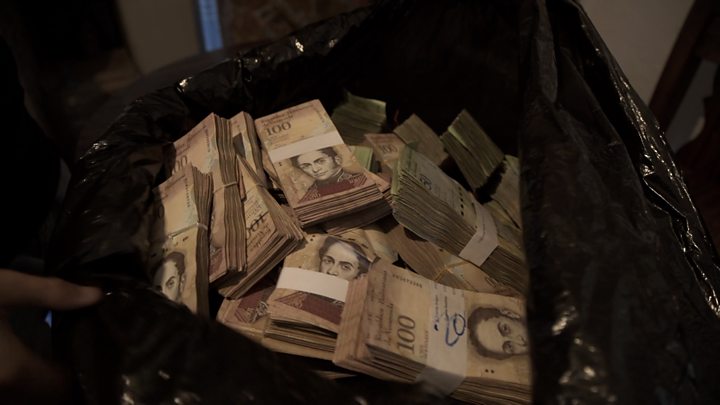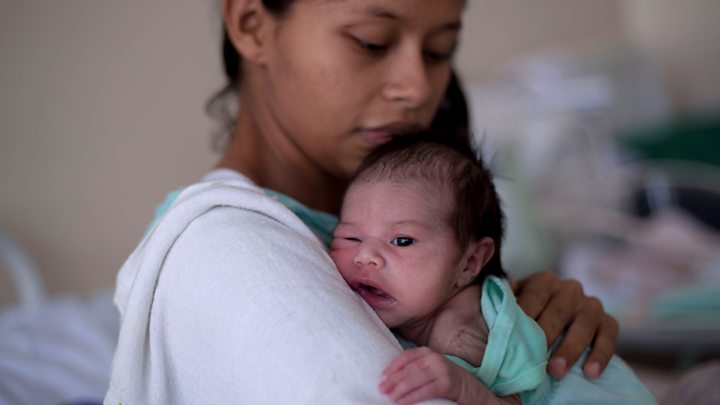President Nicolás Maduro has been elected to a second six-year term in office amid allegations by the international community and Venezuela's opposition that the polls were neither free nor fair.
His victory comes amid a deep economic crisis which has been driving hundreds of thousands of Venezuelans from the South American country. What has caused the crisis and deep divisions that are plaguing Venezuela?
What's at the root of Venezuela's economic crisis?
Venezuela is rich in oil. It has the largest proven oil reserves in the world. But it is arguably precisely this wealth that is also at the root of many of its economic problems.
Venezuela's oil revenues account for about 95% of its export earnings. This means that when oil prices were high, a lot of money was flowing into the coffers of the Venezuelan government.
When socialist President Hugo Chávez was in power, from February 1999 until his death in March 2013, he used some of that money to finance generous social programmes to reduce inequality and poverty.
Two million homes have been created through a socialist government programme called Misión Vivienda (Housing Mission), according to official figures.
But when oil prices dropped sharply in 2014, the government was suddenly faced with a gaping hole in its finances and had to cut back on some of its most popular programmes.
Is its overreliance on oil Venezuela's only problem?
No, many of the policies introduced by Hugo Chávez also backfired. In order to make basic goods more affordable to the poor, his administration introduced price controls - capping the money people pay for such staples as flour, cooking oil and toiletries.
But this meant that many companies no longer found it profitable to produce these items, driving them out of business. This, combined with a lack of foreign currency to import the staples, led to shortages.
Read more:
The Chávez administration had decided in 2003 to take control of the foreign currency exchange.
Since then, Venezuelans wanting to exchange the local currency, the bolívar, for dollars have had to apply to a government-run currency agency. Only those deemed to have valid reasons to buy dollars, for example to import goods, have been allowed to change their bolivares at a fixed rate set by the government.
With many Venezuelans unable to freely buy dollars, the black market flourished and inflation rose.
How did inflation spiral out of control?
Venezuela's annual inflation rate is currently the world's highest and there seems to be no respite in sight.

Venezuela's Central Bank has not published inflation figures since 2015 but economist Steve Hanke from Johns Hopkins University calculated it rose to almost 18,000% in April.
Hyperinflation has been driven up by the government's willingness to print extra money and its readiness to regularly increase the minimum wage in an effort to regain some of its popularity with Venezuela's poor.
The government is also increasingly struggling to get credit after it defaulted on some of its government bonds. With creditors less likely to take the risk of investing in Venezuela, the government has again taken to printing more money, further undermining its value and stoking inflation.
So how did President Maduro get elected in 2013 and re-elected now?
Before Hugo Chávez died of cancer in 2013, he had handpicked Nicolás Maduro as his successor.
Mr Maduro led the country while President Maduro was receiving treatment in Cuba.
Shortly after President Chávez's death, Mr Maduro narrowly beat the opposition candidate Henrique Capriles on a promise to continue Mr Chavez's policies.
But Mr Maduro has proven less popular than his predecessor and divisions between those who still support his United Socialist Party (PSUV) and those who cannot wait for a change of government have been growing.
There is still a loyal core of people who support the party and who say Venezuela's problems are caused not by the government but by imperialist forces such as the US.
They are above all those who directly benefited from the government's social programmes and who argue that, despite the shortages, they are still better off now than before the PSUV came to power in 1999.
There are also many former supporters of the party who have become disillusioned but who say they were swayed by the promise of benefits if they did vote for President Maduro again.
Others, government employees among them, alleged they had been coerced to vote for Mr Maduro by threats that they could otherwise lose their jobs.
Mr Maduro's chances were also boosted by the lack of a popular opposition candidate to confront him.
The opposition MUD coalition decided to boycott the election, alleging that previous polls had been rigged. Only one candidate, Henri Falcón, ignored the boycott but was widely labelled a "traitor" for doing so.
With turnout at a historical low, he fell far short of Mr Maduro's 68% of the vote, something Mr Falcón alleged was due to fraud.
Any light on the horizon?
Oil prices have been rising and should inject much-needed cash into the government's coffers. But a lack of investment in its infrastructure means state-owned oil company PDVSA's output has dwindled, making it harder for it to recover.
Add to that the fact that hundreds of thousands of Venezuelans have left the country, causing a massive brain drain, and prospects are not looking very bright.

Widespread allegations of corruption and the government's hostile attitude towards private businesses have also alienated potential foreign investors.
A number of countries have already said they will not recognise the new government, among them Brazil, Canada, Chile and Panama.
But what could really put the screws on the Venezuelan government would be US sanctions on Venezuela's oil industry. With the US calling the elections a "sham", they may not be far off.